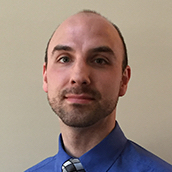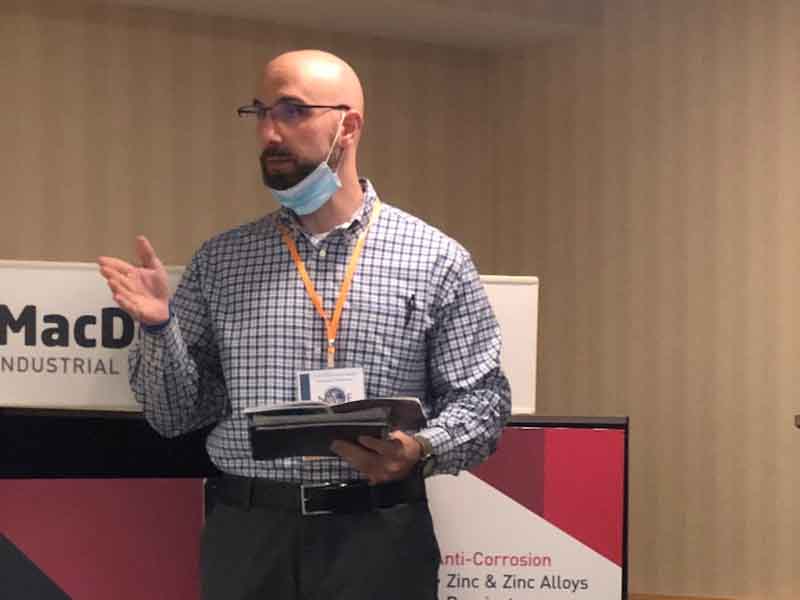Adam Blakeley is Director of Technical Services for the Eastern Region at MacDermid Enthone Industrial Solitions, as well as a Master Surface Finisher.
He has authored papers for numerous industry publications, and is a foremost expert in electroplating.
How did you get your start in the finishing industry?
 Adam BlakeleyMy original plan was to graduate from both The Citadel and Converse College and enter an MA program for Theology at Steubenville University in the hopes of landing a professorship at a junior college. After marrying and moving out of Washington D.C. and my job at the Smithsonian, I had my second child while working two jobs, one as a retail store manager and another as a theater employee, and was enrolled in online schooling. My father approached me with a part-time technical service position with MacDermid and I took him up on the offer thinking I needed the money more than anything else to support my burgeoning family. To my utter surprise, I actually enjoyed the work and then, of course, one thing led to another and I was offered full-time employment and the rest is history.
Adam BlakeleyMy original plan was to graduate from both The Citadel and Converse College and enter an MA program for Theology at Steubenville University in the hopes of landing a professorship at a junior college. After marrying and moving out of Washington D.C. and my job at the Smithsonian, I had my second child while working two jobs, one as a retail store manager and another as a theater employee, and was enrolled in online schooling. My father approached me with a part-time technical service position with MacDermid and I took him up on the offer thinking I needed the money more than anything else to support my burgeoning family. To my utter surprise, I actually enjoyed the work and then, of course, one thing led to another and I was offered full-time employment and the rest is history.
What do enjoy best about the industry?
This industry — and my involvement in it — has no periphery. One can never properly reach its precipice. The industry is constantly growing and expanding at a rate that no single human being would be able to catch up. I love the vastness and the immensity of that prospect because it means there will always be more to learn and discover. I am unceasingly curious about so many things and this industry feeds my limitless inquisitiveness. Having recently become enamored with the beauty and the complexity of the cell in my reading repertoire I found a parallel with our industry. The further we probe into that microcosm of exquisite intricacy and divine artistry found in the cell, the further any semblance of comprehension eludes our grasp. The same absence of any obvious escarpment is felt and realized in the surface finishing industry and I relish that unavoidable truth.
Is your glass half full or half empty?
My glass is almost perpetually half full. I am optimistic and hopeful to an almost annoying and naïve extent as many who know me will attest. My faith informs this reality. To fear and worry about things is, of course, a very human preoccupation, and I am certainly not immune to being a worrier. As a father of four young kids worry is an inevitability; however, I strike to cultivate a more divine outlook. As Jesus exhorts us in the Gospel of John: “Peace I leave you; my peace I give you. I do not give to you as the world gives. Do not let your hearts be troubled and do not be afraid.” St. Paul also writes in 2 Corinthians, “So we do not lose heart. Though our outer self is wasting away, our inner self is being renewed day by day. For this light momentary affliction is preparing for us an eternal weight of glory beyond all comparison, as we look not to the things that are seen but to the things that are unseen. For the things that are seen are transient, but the things that are unseen are eternal.” This sort of miraculous hope and informs the contents of my glass.
What three items would you take with you on a deserted island?
At the risk of sounding too cliché or rationalistic by mentioning things like a survival manual, a water-purification device, a hatchet, etc. I will stay within the spirit of the question as it is, I would assume, intended to elicit the three things you cherish the most in this world. I would probably take The Bible, a family photo album, and a pencil attached to a binder with hundreds of sheets of paper on which to write. These three things are what I cherish most: my faith, my family, and my passion, which is sharing ideas through writing and talking.
What was your favorite subject in school?
I don’t entirely remember what it was in elementary school, but in high school I loved English literature mainly because I had a teacher who — for the first time ever — made me want to be a better student for the sake of being a better student and not merely to earn a better grade, which is, generally speaking, arbitrary and ultimately, along teleological grounds, inconsequential. It also helped that my teacher was incredibly pious and brilliant. At The Citadel I began to fall in love with History. My teachers had the power to resurrect the dead by infusing dusty tomes with the vividness and color of a Marvel movie. I then pursued graduate studies in Liberal Arts, Theology and Philosophy which I continue to read in my spare time. My job now requires I have a firm grasp of the sciences, particularly Chemistry, and so I have elected to learn — and subsequently teach — science to elementary age school children. I suppose all five I’ve listed are my favorite, although if I were forced to choose one, I would pick one that encompasses them all: the Philosophy of Science.
What's the most unusual thing you've ever eaten?
I would consider myself a foodie, but I’ve not been extraordinarily ambitious in this realm. I’ve had alligator, shark, various forms of sashimi, but nothing too extreme.
Do you collect anything?
I used to collect antiquarian daggers and swords, but I’ve always enjoyed antiquarian books. In my travels all over the U.S. I am always on the hunt for used bookstores and sometimes happen upon antiquarian booksellers with the rarest and most beautiful of volumes. I cannot resist the siren call of books.
Are you an introvert or an extrovert?
I am definitely an introvert. Although I enjoy speaking and teaching, I recharge my batteries by being alone and occasionally with a select group of family and friends during sporadic phases.
Which of the five senses would you say is your strongest?
I tend to be a visual learner so I would say sight.
Are you related or distantly related to anyone famous?
I have a few ancestors who’ve fought in various wars throughout American history, but my wife has the more interesting history. Her great uncle, Adib Shishakli, was a Syrian military leader and President of Syria of Kurdish Origin (1953–54). He rose to power during a military coup d’etat.
What do you do to keep fit?
I tend to prefer anaerobic exercises like weightlifting to aerobic exercises like running. There is a genetic contingent there as my father founded a powerlifting gym back in the 1970s. I am working up to being able to lift like he did back in the day when they would bench over 400 lbs. without the lifting gear common to powerlifters nowadays. I also try to eat as healthy as possible. I am hindered by life as a traveling tech service manager, but with the advent of COVID, I am traveling less and so my wife and I spend time together cooking, which allows us to maintain our health.
Does your family have a “motto” – spoken or unspoken?
I have been chipping away at a family motto or a family mission statement recently that has yet to be finished, but some of the maxims include the following: “We are a family that values doing things over having things. We are a family that cares more about building character than building our resumes by living lives of love and generosity.”
If you were ruler of your own country what would be the first law you would introduce?
That’s a hard one. I tend to be rather libertarian in my approach to laws, but I recognize that certain laws are inevitable to avoid anarchy. My favorite theologian, St. Thomas Aquinas, defines law as “an ordinance of reason for the common good, made by someone who has care of the community, and promulgated.” In other words, I would want something based on universal principles and reason. I find that the mark of a good society is one in which it is easy to be a good person. Hopefully that society would encourage and inspire its citizenry to choose and seek after what is true, moral, and beautiful. This is what I attempt to do as a leader and manager of my team.
What three things do you think of the most each day?
Within Catholic moral theology and ecology persists an aphorism that grounds and guides our perspective, forcing us to jettison the banalities and vanities of daily life to focus on what is truly important. It is called ‘quattuor novissima,’ or the four last things. I realize by choosing four things I am cheating, but I hope you will afford me this slight amendment. By quattuor novissima is meant death, judgement, heaven, and hell. We are to govern, shepherd, and navigate our lives by giving proper attention to these four ontological and eschatological inevitabilities. These elements were given an updated form in Stephen Covey’s 7 Habits of Highly Effective People and particularly, Habit 3, “Put First Things First.” By this is meant “organizing and executing around your most important priorities. It is living and being driven by the principles you value most, not by the agendas and forces surrounding you.” This is how I prevent myself from getting swept up in the trivialities and superficialities of life.
If you had a warning label, what would yours say?
‘Doesn’t Enjoy Small talk.’ Tell me what you really think and let’s dive down together deep into the marrow of those thoughts and ideas that drive and motivate you so as to learn, explore, discover, and appreciate everything the world has to offer. Everything else is inconsequential and therefore tiresome.
What song would you say best sums you up?
If I had to choose, Amazing Grace, particularly the part about being a wretch who was saved and who was blind, but can now see.
What celebrity would you like to meet at Starbucks for a cup of coffee?
I would assume you are looking for a living celebrity since I would have to be meeting them and you didn’t mention the potential for resurrection or resuscitation. If someone was interested in having a real, honest, and probing conversation with me, I would honestly love to talk to anyone out there. I suppose I would appreciate the insights generated by public intellectuals I admire like Dr. Peter Kreeft of Boston College or Dr. Jordan Peterson of the University of Toronto or Dr. Anthony Esolen of Magdalen College or Dr. Thomas Sowell of Stanford University. I would enjoy talking with someone with whom I vehemently disagree — even political figures with a lot of power and influence — provided the encounter could remain private and not at all a public relations opportunity. I would want to understand the motivations driving my interlocutor’s decisions to do things that run so very contrary to my entire way of thinking. I am truly fascinated with people who hold opinions radically different from my own.
What's the most interesting thing you can see out of your office or kitchen window?
My four children playing in the back yard. It never ceases to bring me joy.
On a scale of 1-10, how funny would you say you are?
I love puns and dad jokes and all things silly and corny. I think I have a decent sense of humor. I love wit, banter, sarcasm, and especially satire. I would probably rate myself a 7.5.
Where do you see yourself in 10 years?
I will be 45 years old and hope to continue to do much of the same things I am doing now. I really love my job managing the field tech service team for MacDermid Enthone and teaching classes for the NASF. My involvement as Education Chairman with the local NASF Southeast chapter and planning technical sessions is satisfying. My favorite thing is being a father and husband. Having to think about a decade from now I’ve happened upon the sobering reality that two of my kids will be legal adults in 10 years. It then called me to hope and pray I have done my job of raising children of probity, virtue, and generosity before they reach adulthood.
What was your first job?
My first real job was as a sandwich maker for Substation II. I loved it. I got a free six-inch sandwich I could make any way I wanted with as much meat and toppings as I could fit between two pieces of six-inch bread.
How many languages do you speak?
I took college-level German at The Citadel and studied for weeks in Germany, but would not consider myself fluent. Lately I’ve been attempting Spanish with a bilingual friend of mine and using an app called Duo Lingo, but I would not consider myself fluent in that language either. With regret I must admit I only speak English fluently right now.
Who is the most intelligent person you know?
For sheer brilliance I would have to say my friend, Jonathan Burgess. He’s a retired Marine only a few years my junior and is deeply enmeshed in a doctoral program for Rhetoric, Communication and Information Design at Clemson University. He is studying things that make my head hurt. He is truly a towering intellectual figure.
If you had to describe yourself as an animal, which one would it be?
I would hope to be associated with something fierce, like a lion or a bear, or even a honey badger known to all creatures as the most aggressive animal on the planet, but I am probably more of a lover than a fighter if I had to be honest. There is a fire inside me that can be engaged if need be, but my strengths lie more in my cognitive skills and less in my more belligerent tendencies. I suppose that makes me more of a koala.
What is one thing you will never do again?
I hope to never have to work in retail again. I learned several valuable lessons during my tenure in retail, but it is, I hate to say, for me, a realm of enervating, soul-sucking, enfeeblement.
Who knows you the best?
My wife. She gets me.



































